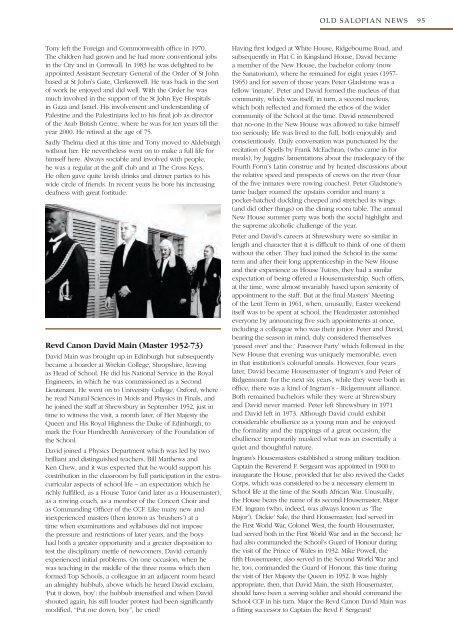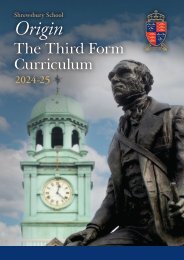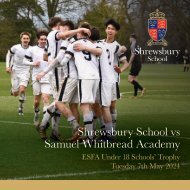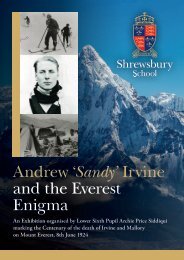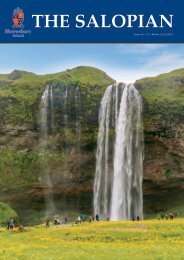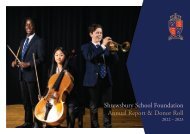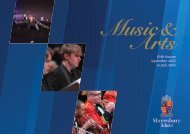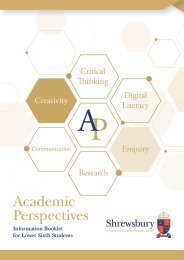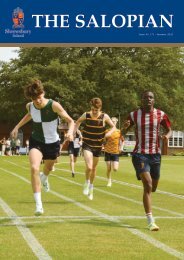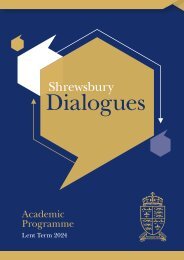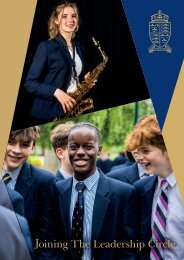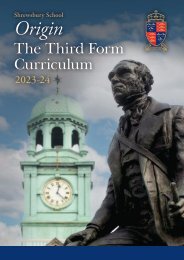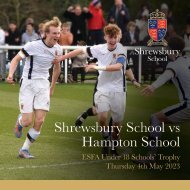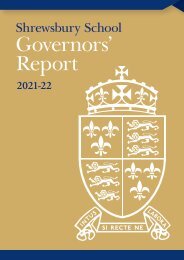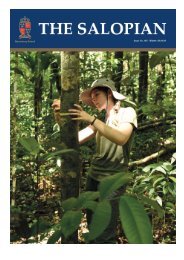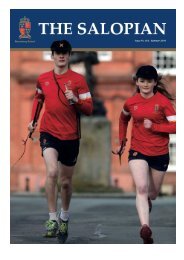The Salopian no. 160 - Summer 2017
- No tags were found...
Create successful ePaper yourself
Turn your PDF publications into a flip-book with our unique Google optimized e-Paper software.
OLD SALOPIAN NEWS 95<br />
Tony left the Foreign and Commonwealth office in 1970.<br />
<strong>The</strong> children had grown and he had more conventional jobs<br />
in the City and in Cornwall. In 1983 he was delighted to be<br />
appointed Assistant Secretary General of the Order of St John<br />
based at St John’s Gate, Clerkenwell. He was back in the sort<br />
of work he enjoyed and did well. With the Order he was<br />
much involved in the support of the St John Eye Hospitals<br />
in Gaza and Israel. His involvement and understanding of<br />
Palestine and the Palestinians led to his final job as director<br />
of the Arab British Centre, where he was for ten years till the<br />
year 2000. He retired at the age of 75.<br />
Sadly <strong>The</strong>lma died at this time and Tony moved to Aldeburgh<br />
without her. He nevertheless went on to make a full life for<br />
himself here. Always sociable and involved with people,<br />
he was a regular at the golf club and at <strong>The</strong> Cross Keys.<br />
He often gave quite lavish drinks and dinner parties to his<br />
wide circle of friends. In recent years he bore his increasing<br />
deafness with great fortitude.<br />
Revd Ca<strong>no</strong>n David Main (Master 1952-73)<br />
David Main was brought up in Edinburgh but subsequently<br />
became a boarder at Wrekin College, Shropshire, leaving<br />
as Head of School. He did his National Service in the Royal<br />
Engineers, in which he was commissioned as a Second<br />
Lieutenant. He went on to University College, Oxford, where<br />
he read Natural Sciences in Mods and Physics in Finals, and<br />
he joined the staff at Shrewsbury in September 1952, just in<br />
time to witness the visit, a month later, of Her Majesty the<br />
Queen and His Royal Highness the Duke of Edinburgh, to<br />
mark the Four Hundredth Anniversary of the Foundation of<br />
the School.<br />
David joined a Physics Department which was led by two<br />
brilliant and distinguished teachers, Bill Matthews and<br />
Ken Chew, and it was expected that he would support his<br />
contribution in the classroom by full participation in the extracurricular<br />
aspects of school life – an expectation which he<br />
richly fulfilled, as a House Tutor (and later as a Housemaster),<br />
as a rowing coach, as a member of the Concert Choir and<br />
as Commanding Officer of the CCF. Like many new and<br />
inexperienced masters (then k<strong>no</strong>wn as ‘brushers’) at a<br />
time when examinations and syllabuses did <strong>no</strong>t impose<br />
the pressure and restrictions of later years, and the boys<br />
had both a greater opportunity and a greater disposition to<br />
test the disciplinary mettle of newcomers, David certainly<br />
experienced initial problems. On one occasion, when he<br />
was teaching in the middle of the three rooms which then<br />
formed Top Schools, a colleague in an adjacent room heard<br />
an almighty hubbub, above which he heard David exclaim,<br />
‘Put it down, boy’: the hubbub intensified and when David<br />
shouted again, his still louder protest had been significantly<br />
modified, “Put me down, boy”, he cried!<br />
Having first lodged at White House, Ridgebourne Road, and<br />
subsequently in Flat C in Kingsland House, David became<br />
a member of the New House, the bachelor colony (<strong>no</strong>w<br />
the Sanatorium), where he remained for eight years (1957-<br />
1965) and for seven of those years Peter Gladstone was a<br />
fellow ‘inmate’. Peter and David formed the nucleus of that<br />
community, which was itself, in turn, a second nucleus,<br />
which both reflected and formed the ethos of the wider<br />
community of the School at the time. David remembered<br />
that <strong>no</strong>-one in the New House was allowed to take himself<br />
too seriously; life was lived to the full, both enjoyably and<br />
conscientiously. Daily conversation was punctuated by the<br />
recitation of Spells by Frank McEachran, (who came in for<br />
meals), by Juggins’ lamentations about the inadequacy of the<br />
Fourth Form’s Latin construe and by heated discussions about<br />
the relative speed and prospects of crews on the river (four<br />
of the five inmates were rowing coaches). Peter Gladstone’s<br />
tame badger roamed the upstairs corridor and many a<br />
pocket-hatched duckling cheeped and stretched its wings<br />
(and did other things) on the dining room table. <strong>The</strong> annual<br />
New House summer party was both the social highlight and<br />
the supreme alcoholic challenge of the year.<br />
Peter and David’s careers at Shrewsbury were so similar in<br />
length and character that it is difficult to think of one of them<br />
without the other. <strong>The</strong>y had joined the School in the same<br />
term and after their long apprenticeship in the New House<br />
and their experience as House Tutors, they had a similar<br />
expectation of being offered a Housemastership. Such offers,<br />
at the time, were almost invariably based upon seniority of<br />
appointment to the staff. But at the final Masters’ Meeting<br />
of the Lent Term in 1961, when, unusually, Easter weekend<br />
itself was to be spent at school, the Headmaster astonished<br />
everyone by an<strong>no</strong>uncing five such appointments at once,<br />
including a colleague who was their junior. Peter and David,<br />
bearing the season in mind, duly considered themselves<br />
‘passed over’ and the ‘ Passover Party’ which followed in the<br />
New House that evening was uniquely memorable, even<br />
in that institution’s colourful annals. However, four years<br />
later, David became Housemaster of Ingram’s and Peter of<br />
Ridgemount: for the next six years, while they were both in<br />
office, there was a kind of Ingram’s - Ridgemount alliance.<br />
Both remained bachelors while they were at Shrewsbury<br />
and David never married. Peter left Shrewsbury in 1971<br />
and David left in 1973. Although David could exhibit<br />
considerable ebullience as a young man and he enjoyed<br />
the formality and the trappings of a great occasion, the<br />
ebullience temporarily masked what was an essentially a<br />
quiet and thoughtful nature.<br />
Ingram’s Housemasters established a strong military tradition.<br />
Captain the Reverend F. Sergeant was appointed in 1900 to<br />
inaugurate the House, provided that he also revived the Cadet<br />
Corps, which was considered to be a necessary element in<br />
School life at the time of the South African War. Unusually,<br />
the House bears the name of its second Housemaster, Major<br />
F.M. Ingram (who, indeed, was always k<strong>no</strong>wn as ‘<strong>The</strong><br />
Major’). ‘Dickie’ Sale, the third Housemaster, had served in<br />
the First World War, Colonel West, the fourth Housemaster,<br />
had served both in the First World War and in the Second; he<br />
had also commanded the School’s Guard of Ho<strong>no</strong>ur during<br />
the visit of the Prince of Wales in 1932. Mike Powell, the<br />
fifth Housemaster, also served in the Second World War and<br />
he, too, commanded the Guard of Ho<strong>no</strong>ur, this time during<br />
the visit of Her Majesty the Queen in 1952. It was highly<br />
appropriate, then, that David Main, the sixth Housemaster,<br />
should have been a serving soldier and should command the<br />
School CCF in his turn. Major the Revd Ca<strong>no</strong>n David Main was<br />
a fitting successor to Captain the Revd F. Sergeant!


